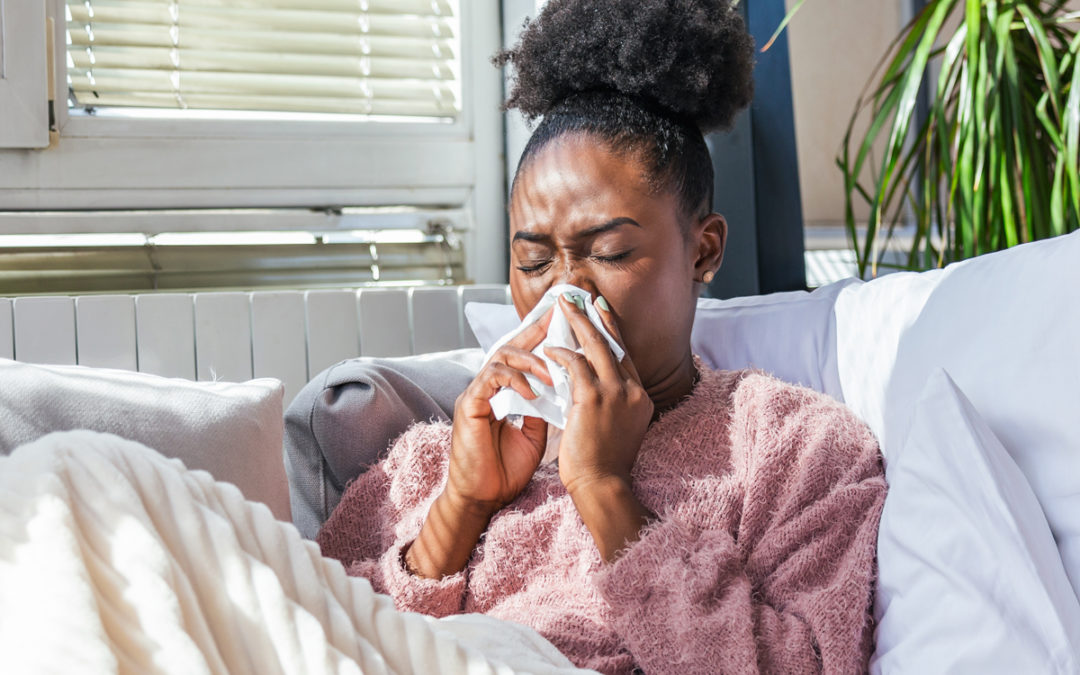A sinus infection, also known as sinusitis, occurs when the cavities around the nasal passages become infected and swollen. Sinus infections share many symptoms with the common cold, making it easy for people to delay appropriate treatment. Because it can be challenging to tell the difference, knowing the symptoms of a sinus infection will help you determine when you need to see a doctor.
1. Pain and Pressure Around Face
Many people think that our sinuses are located just in the nose. The truth is that these sacs cover much more space around our nasal area from the lower forehead down to the front of the cheekbones.
Due to the fact that they cover a great part of the face, you might feel discomfort all over this location. As mucus builds up in the nasal passages, it might press on your nerves. As an outcome, you might feel inflammation, pressure, or heaviness in your face. Bending over usually makes the pressure increase. Sometimes, this pressure or pain can even interfere with sleep.
2. Headache
More than the pressure in your face, a sinus infection can likewise trigger a complete headache. Blockage and swelling can trigger the muscles around your head to tighten up and cause a headache.
3. Dizziness
As pointed out previously, mucous will obstruct your nasal passages. This blockage includes weight to your face. As you walk around, the included heaviness can toss your balance off. This sign is particularly obvious when you lean your head forward.
4. Postnasal Drip
The most obvious sign of a sinus infection is the existence of discharge from the nose. This indication resembles what you would experience with a routine cold or seasonal influenza. The mucous from your sinuses might likewise leak down the back of your throat (postnasal drip).
The discharge color can help you determine whether you’re having a cold or a sinus infection. A cold will usually cause mucus to be watery and clear or cloudy. An infection often means the mucus will be greenish or with a yellow tint. This is because your immune system is increasing white blood cells to fight off the infection.
5. Congestion
Together with the postnasal drip, your sinuses might be irritated and inflamed. As an outcome, the mucus is not able to drain properly and becomes trapped, causing the feeling of congestion.
6. Lack of Smell and Taste
Sinus congestion will often impact your sense of smell. Because breathing through your nose becomes difficult, you won’t be able to smell like you usually do. Your sense of smell informs your sense of taste, so while you will most likely be able to tell apart major ingredients, like salty instead of sweet, food will probably taste fairly bland for you while your sinuses are infected.
7. Bad Breath
When you have a sinus infection bacteria gets caught in your nasal cavities, which can produce a foul smell. The discharge from your nose can likewise go to the back of your throat (postnasal drip), therefore triggering halitosis (bad breath).
8. Fever
A fever is a major indicator of an infection. Your body raises its temperature to fight off a virus or bacteria. Some people develop a fever with a sinus infection. Other symptoms associated with a fever typically include chills, muscle aches and exhaustion.
9. Coughing
A cough might likewise be a sign of a sinus infection. As mucus leaks down into your throat, it can activate a cough. Coughing up phlegm is a major sign that have more than a common cold.
10. Fatigue
Fighting a sinus infection takes a lot of energy from your body, so it is common to feel tired. The constant pressure on your face, a bad cough, and dizziness can also add to the fatigue.
Differentiating between a cold and a sinus infection is very important because they require different treatments. If you are experiencing these symptoms, our team at Premier Allergy, Asthma & Sinus Care can provide you with a proper diagnosis and care. Contact us today to schedule an appointment.
What to Read Next
Girl Scout Cookie Allergens Guide and Allergen-Conscious Imitation Recipes
March 12th is National Girl Scouts Day, and we’re taking advantage by participating in the age-old...
Valentine’s Day Gifts For Loved Ones With Allergies & Asthma
With Valentine’s Day right around the corner, you might be wondering what to get your loved ones....
Do Houseplants Help or Hurt Asthma and Allergies?
Today is Houseplant Appreciation Day! While we love some gorgeous greenery as much as the next...








